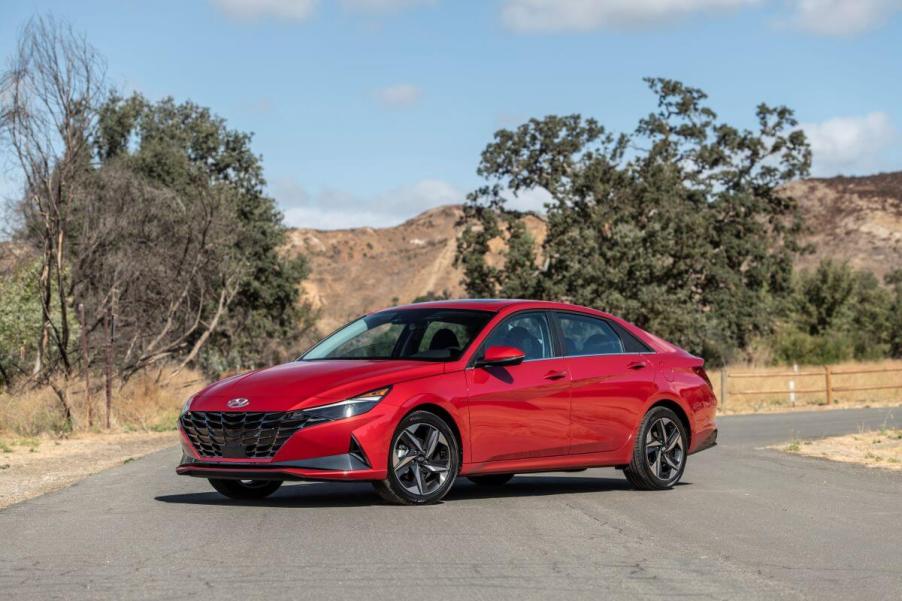
The Cheapest New Cars of 2023 Are Flying Off Dealership Lots
Everyday, it seems like there’s another story about the death of cheap cars. We’re guilty of it, too, and for a long time the sales figures drove that narrative. Especially considering the more recent crossover SUV takeover we’ve seen in the U.S. markets. Recently, the pendulum has started swinging the other way. Now, some of the cheapest new cars are flying off of dealership lots so far in 2023.
Several cheap compact cars see big sales jumps in 2023

Nearly everything, from the Mazda3 to the Nissan Versa and Hyundai Elantra, is on the rise so far in 2023. In fact, cheap, small car sales aren’t just up by a little – they’re soaring near triple digit increases.
The Nissan Versa, for example, has nearly doubled in sales so far in 2023. According to GoodCarBadCar, the smallest Nissan is up nearly 96% over 2022. And in June alone, the littlest compact is up over 121%.
It’s a similar story for Nissan’s other compact, the Sentra. Sentra sales rose by 107% between May and June, putting the small sedan up 29.5% over its 2022 figures.
Moving to the Korean brands, Hyundai’s Elantra model has posted big numbers in 2023 as well. This cheap, small sedan is flying off dealership lots at a rate of 53% more than 2022. It picked up the pace in June as well, posting 60% more units sold than the month prior at 13,424 cars.
Even Hyundai’s smallest SUV is getting in on the sales bump. The cheapest and smallest compact crossover is up 29.31% compared to 2022, and in June posted a 35% gain over May.
Perhaps the most vexing bit of data surrounds the Mazda3. The 3 is Mazda’s cheapest and smallest car, but it hasn’t sold well despite an upscale experience and satisfying driving behavior. Or at least, it hadn’t until June of 2023. Suddenly, the Mazda compact saw a 217% spike in sales over May. That gain alone is good enough to boost its 2023 sales to a scant 1.82% over 2022.
It would be easy to think that these cars are simply taking market share from other popular segment leaders. Not the case. The Toyota Corolla is only down by 16% over 2022, while the Honda Civic is up 33.5%. And within the Toyota camp, the Corolla Cross is up by 27% over last year, which can undoubtedly explain some of the sedan’s sales dip.
Why are cheap cars suddenly selling so fast?

There are several market factors that can explain why cheap, small cars have suddenly started selling like hotcakes. For one, inflation is putting the squeeze on buyers. Higher interest rates coupled with increased vehicle pricing are creating affordability concerns in buyers, as this KBB study confirms.
In addition, pandemic vehicle leases and purchases are now approaching the end of their life cycle. If a typical lease is 3 years, the increase in small vehicle sales coincides with the tumbling pandemic car pricing of 2020.
Combined with the affordability problem above, it means that lessees are turning in vehicles for something new, only to find that they can’t afford a similar vehicle in this new, inflated market. Since they still need something to drive, the object becomes finding the most affordable option on the lot.
Similarly, a shift in the overall used car market has seen drastically reduced trade-in and resale values for most vehicles. Many were spoiled by the scarcity of late 2020 and 2021, when many buyers were making money on trades as dealers scrambled to snatch up whatever inventory they could.
Those same buyers were then willing to pay a higher price for their next vehicle, as resale values remained high and the short-term risk was relatively low. However, those values started tumbling in late 2022, leaving many upside down on their auto loans. Confirmed by this USA Today story, as interest rates rose and the value of the car in the driveway fell, buying power diminished. So, when it came time to get something new, it meant finding the cheapest available option to help offset the negative equity.
Will affordable cars make a comeback?
While sales numbers are one thing, automakers have stated a willingness to give up overall market share to chase higher profits. However, as fewer Americans show a willingness to shell out in such an uncertain economic landscape, manufacturers may have no choice but to bring back some more affordable options.




